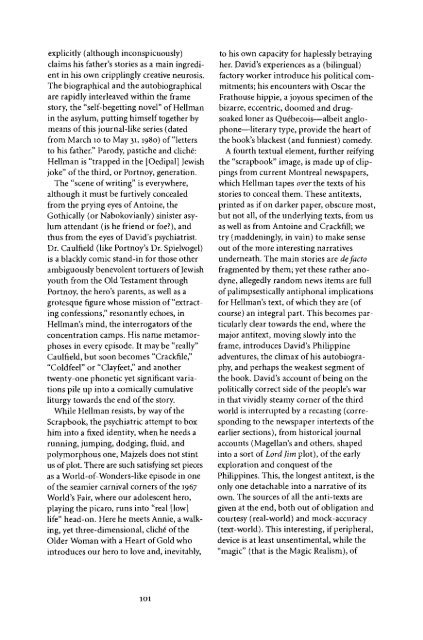To All Appearances A Lady - University of British Columbia
To All Appearances A Lady - University of British Columbia
To All Appearances A Lady - University of British Columbia
You also want an ePaper? Increase the reach of your titles
YUMPU automatically turns print PDFs into web optimized ePapers that Google loves.
explicitly (although inconspicuously)<br />
claims his father's stories as a main ingredient<br />
in his own cripplingly creative neurosis.<br />
The biographical and the autobiographical<br />
are rapidly interleaved within the frame<br />
story, the "self-begetting novel" <strong>of</strong> Hellman<br />
in the asylum, putting himself together by<br />
means <strong>of</strong> this journal-like series (dated<br />
from March 10 to May 31,1980) <strong>of</strong> "letters<br />
to his father." Parody, pastiche and cliché:<br />
Hellman is "trapped in the [Oedipal] Jewish<br />
joke" <strong>of</strong> the third, or Portnoy, generation.<br />
The "scene <strong>of</strong> writing" is everywhere,<br />
although it must be furtively concealed<br />
from the prying eyes <strong>of</strong> Antoine, the<br />
Gothically (or Nabokovianly) sinister asylum<br />
attendant (is he friend or foe?), and<br />
thus from the eyes <strong>of</strong> David's psychiatrist.<br />
Dr. Caulfield (like Portnoy's Dr. Spielvogel)<br />
is a blackly comic stand-in for those other<br />
ambiguously benevolent torturers <strong>of</strong> Jewish<br />
youth from the Old Testament through<br />
Portnoy, the hero's parents, as well as a<br />
grotesque figure whose mission <strong>of</strong> "extracting<br />
confessions," resonantly echoes, in<br />
Hellman's mind, the interrogators <strong>of</strong> the<br />
concentration camps. His name metamorphoses<br />
in every episode. It may be "really"<br />
Caulfield, but soon becomes "Crackfile,"<br />
"Coldfeel" or "Clayfeet," and another<br />
twenty-one phonetic yet significant variations<br />
pile up into a comically cumulative<br />
liturgy towards the end <strong>of</strong> the story.<br />
While Hellman resists, by way <strong>of</strong> the<br />
Scrapbook, the psychiatric attempt to box<br />
him into a fixed identity, when he needs a<br />
running, jumping, dodging, fluid, and<br />
polymorphous one, Majzels does not stint<br />
us <strong>of</strong> plot. There are such satisfying set pieces<br />
as a World-<strong>of</strong>-Wonders-like episode in one<br />
<strong>of</strong> the seamier carnival corners <strong>of</strong> the 1967<br />
World's Fair, where our adolescent hero,<br />
playing the picaro, runs into "real [low]<br />
life" head-on. Here he meets Annie, a walking,<br />
yet three-dimensional, cliché <strong>of</strong> the<br />
Older Woman with a Heart <strong>of</strong> Gold who<br />
introduces our hero to love and, inevitably,<br />
to his own capacity for haplessly betraying<br />
her. David's experiences as a (bilingual)<br />
factory worker introduce his political commitments;<br />
his encounters with Oscar the<br />
Frathouse hippie, a joyous specimen <strong>of</strong> the<br />
bizarre, eccentric, doomed and drugsoaked<br />
loner as Québécois—albeit anglophone—literary<br />
type, provide the heart <strong>of</strong><br />
the book's blackest (and funniest) comedy.<br />
A fourth textual element, further reifying<br />
the "scrapbook" image, is made up <strong>of</strong> clippings<br />
from current Montreal newspapers,<br />
which Hellman tapes over the texts <strong>of</strong> his<br />
stories to conceal them. These antitexts,<br />
printed as if on darker paper, obscure most,<br />
but not all, <strong>of</strong> the underlying texts, from us<br />
as well as from Antoine and Crackfill; we<br />
try (maddeningly, in vain) to make sense<br />
out <strong>of</strong> the more interesting narratives<br />
underneath. The main stories are de facto<br />
fragmented by them; yet these rather anodyne,<br />
allegedly random news items are full<br />
<strong>of</strong> palimpsestically antiphonal implications<br />
for Hellman's text, <strong>of</strong> which they are (<strong>of</strong><br />
course) an integral part. This becomes particularly<br />
clear towards the end, where the<br />
major antitext, moving slowly into the<br />
frame, introduces David's Philippine<br />
adventures, the climax <strong>of</strong> his autobiography,<br />
and perhaps the weakest segment <strong>of</strong><br />
the book. David's account <strong>of</strong> being on the<br />
politically correct side <strong>of</strong> the people's war<br />
in that vividly steamy corner <strong>of</strong> the third<br />
world is interrupted by a recasting (corresponding<br />
to the newspaper intertexts <strong>of</strong> the<br />
earlier sections), from historical journal<br />
accounts (Magellan's and others, shaped<br />
into a sort <strong>of</strong> Lord Jim plot), <strong>of</strong> the early<br />
exploration and conquest <strong>of</strong> the<br />
Philippines. This, the longest antitext, is the<br />
only one detachable into a narrative <strong>of</strong> its<br />
own. The sources <strong>of</strong> all the anti-texts are<br />
given at the end, both out <strong>of</strong> obligation and<br />
courtesy (real-world) and mock-accuracy<br />
(text-world). This interesting, if peripheral,<br />
device is at least unsentimental, while the<br />
"magic" (that is the Magic Realism), <strong>of</strong><br />
101

















